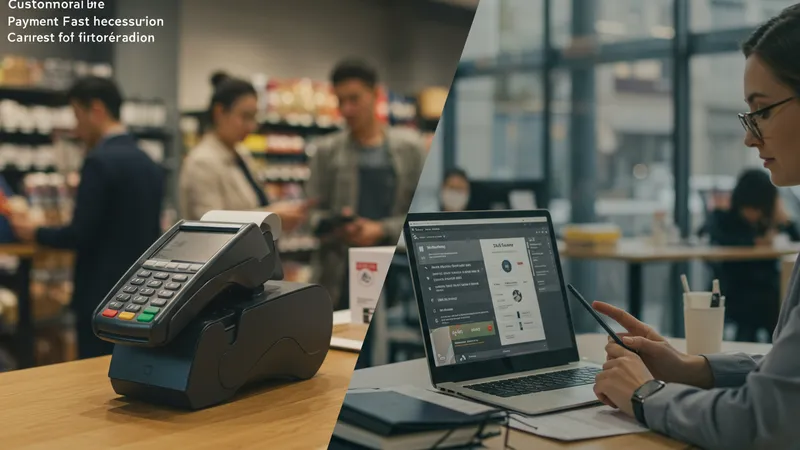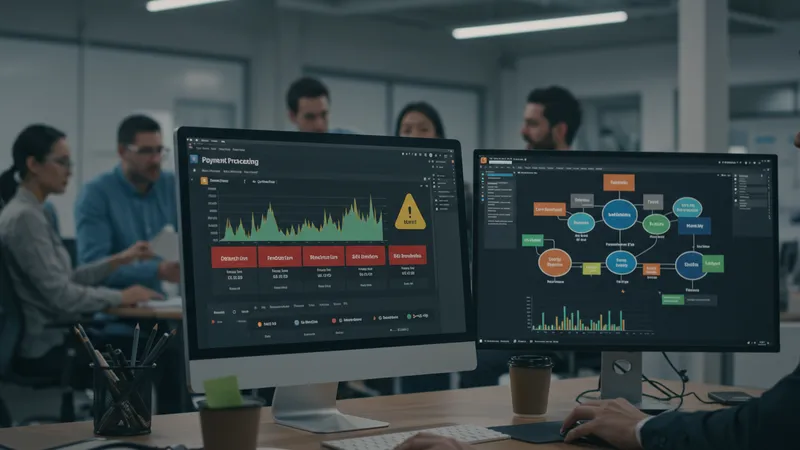Did you know that 60% of small businesses face payment fraud each year? It’s shocking how often small entrepreneurs underestimate the need for secure credit card processing systems!
As cyber threats skyrocket during the digital transformation, understanding secure payment processing is crucial. The financial lifeline of many small businesses depends on selecting the right system.

Many assume that only large corporations need top-tier credit card processing security, but small businesses are surprisingly vulnerable. With increasing reliance on digital transactions, even mom-and-pop shops risk financial catastrophe without robust payment solutions. What's more astonishing is how advanced technology can significantly reduce this risk at a minimal cost. You’d think high security would break the bank, but that’s not even the wildest part…
Some credit card processors now offer cutting-edge technology once reserved for Fortune 500 companies, available to even the smallest of businesses! Imagine tap-and-go security, instantaneous fraud alerts, and AI-driven insights—all within reach. This isn't just a game-changer, it's revolutionizing the way small businesses handle payments. But believe it or not, the best feature might just be a complete surprise…
These innovations are saving small businesses from potential disaster, and the next advancements in the field are set to be even more groundbreaking. What happens next shocked even the experts, and the evolution of secure credit card processing is just beginning. So, which features will redefine your business as we know it? Keep reading to unravel the secrets...
While many small business owners focus on the transaction fees of credit card processing, hidden costs such as chargeback disputes and compliance penalties can quietly erode profits. It's a seldom-discussed reality that these fees can sometimes double the actual cost of a transaction. These invisible expenses make choosing the right system more vital than ever.

Understanding these hidden costs can protect a business from unexpected financial drains. Savvy entrepreneurs are now seeking processors that offer comprehensive fraud protection and dispute management to mitigate these overlooked expenses. What you read next might change how you see this forever.
The clever use of technology in modern payment systems can help circumvent these hidden costs. Processors like Stripe and Square are developing functionalities that automatically flag suspicious transactions, significantly reducing chargeback occurrences. But there's one more twist that's catching everyone's attention…
Lesser-known hidden costs include PCI compliance fees, which can compound significantly if not managed properly. These fees, which ensure data security standards, are critical but often misunderstood. The knowledge of how to effectively navigate these fees can mean the difference between thriving and just surviving in today’s competitive market.
The rise of contactless payment options is becoming a significant trend in secure credit card processing. With consumers prioritizing convenience and security, this shift is essential for small businesses aiming to keep up with consumer expectations. Some businesses report increased customer satisfaction and a quicker checkout process by integrating this technology.

Another breakthrough is the incorporation of machine learning algorithms to predict and prevent fraudulent activity in real-time. These systems are designed to learn from previous transactions and automatically block suspicious activities, providing a layer of security that was once beyond reach for small enterprises. But this wave of innovation brings more!
Biometric payments are also gaining traction, offering a robust alternative to traditional security methods. Techniques such as fingerprint and facial recognition ensure heightened security and frictionless customer experience—an attractive offering for the tech-savvy customer base. Yet, it's not just the technology that's making waves…
The adoption of blockchain technology for secure payment processing is on the rise, as it promises unparalleled transparency and security. While it is still in the budding phase, businesses that have ventured into this realm are already seeing the benefits of faster transactions and minimized fraud risk, hinting at a potential future standard in payments.
In today’s hyper-competitive market, payment processing systems need to offer more than just security—they must enhance the overall customer experience. Businesses leveraging systems that provide a seamless checkout are reporting increased customer loyalty and positive feedback. A complicated payment process can lead users to abandon their purchases altogether.

There are insightful analytics available through advanced processors which highlight customer behavior and preferences, allowing businesses to tailor their offerings accordingly. Surprisingly, these analytics often come included with the payment system, providing an unexpected bonus to resourceful business owners. But there’s another element to consider…
Systems offering easy integration with other software and shopping platforms are also highly sought after. The ability for merchants to customize their payment process through open APIs is transforming how they interact with their payment processing, leading to a more efficient and user-friendly system. However, the transformation doesn’t stop here…
Consider loyalty programs and rewards systems integrated with payment technology. This not only incentivizes purchases but also builds a meaningful connection with consumers. Companies that master this integration are reaping significant rewards, allowing them to stand out in an increasingly crowded market.
Staying compliant with regulations can be a daunting task for small businesses, but it’s crucial in maintaining customer trust and avoiding hefty fines. Changes in laws can happen with little notice, leaving businesses scrambling to adjust. Failure to comply could result in significant financial losses and damaged reputations.

Fortunately, many payment processors are now including compliance assistance in their services, helping businesses keep up with evolving requirements. However, it’s essential for owners to remain proactive and informed about responsibilities that fall beyond these services. Yet, there’s a caveat that often goes unnoticed…
GDPR and CCPA have had a profound impact on how businesses across the globe handle personal data. This isn't just about maintaining compliance; it's about leveraging these regulations to further enhance business credibility and consumer trust. Adapting to these changes can be a powerful tool for brand building if approached correctly.
Most businesses underestimate the resources needed for compliance, while those that invest in understanding and implementing these measures find themselves better protected and more respected. What happens when distance selling directives change or new data laws emerge? That’s where some businesses find their greatest challenges—or opportunities...
Finding a credit card processing system that aligns with your unique business model can significantly influence your bottom line. Retailers need systems that support quick transactions during peak hours, while service providers might prioritize systems that allow easy billing for appointments. The extent to which a system supports your specific needs couldn't be more pivotal.

Customization is key, with systems offering configurable options that cater to diverse business requirements, including multiple currency handling or integration with existing software. Surprisingly, many small business owners are unaware of these customizable features which can tailor their customer interactions and payment flow seamlessly. But here’s where it gets better…
The choice of a system should also consider customer payment preferences—some prefer traditional card payments, while others lean towards digital wallets or mobile pay options. Businesses that recognize and adapt to these preferences often see improved customer satisfaction and loyalty. Yet there’s another wild card factor to consider...
The nature of support services provided by the processor can make or break your payment processing experience. From resolving disputes to handling technical glitches, the right support can ensure that interruptions are minimal and operations run smoothly. In a world where time equates to money, this factor should not be overlooked.
Payment fraud persists as a growing threat to small businesses worldwide, with criminals continuously evolving their tactics to exploit vulnerabilities. From phishing emails impersonating trusted vendors to sophisticated hacking schemes, the landscape is constantly shifting. Small businesses, unfortunately, are often an easy target due to limited security measures.

Educating oneself and staying aware of these tactics is fundamental to protecting one's business. Savvy entrepreneurs employ tools that monitor suspicious activity and offer real-time alerts, often preventing fraud before it starts. It’s fascinating to see how swiftly the tide can turn with the right technology and knowledge in place. Yet, there's more on the horizon...
The advent of AI in fraud detection is steering the narrative. These systems learn and predict potential threats, adapting to new fraudulent tactics faster than traditional systems ever could. This integration of AI not only deters fraud but actively supervises transactions, giving peace of mind to business owners. You might be surprised at how robust these systems are, but there's another layer…
While AI brings promise, the human element remains indispensable. Training staff to recognize common fraud indicators and act swiftly, combined with solid technological safeguards, can create a powerful defense against potential threats. Businesses embracing both aspects often see the most success in preventing fraud.
Consider the small boutique in Paris that was nearly brought to its knees by a series of fraudulent charges. Through proactive engagement with their payment processor and strategic implementation of advanced security measures, they recovered and even thrived, experiencing increased sales amid enhanced security. Their story is not unique but becoming more frequent.

In contrast, a neighborhood café in New York faced closure after neglecting the importance of secure processing, leading to significant financial loss and a collapse in consumer trust. It highlights the critical nature of choosing the right systems and underscores how quickly things can spiral out of control without proper precautions. But that’s not the end of it…
Numerous businesses find new success by integrating holistic security strategies, such as multi-layer authentication and robust transaction monitoring. These approaches not only bolster defenses but can also improve customer perceptions, enhancing trust in the company. Now, what’s even more compelling is the evolution that follows…
The shift towards more secure payment systems is not just a trend but a necessary leap toward the future. As businesses worldwide adapt to the new standards of security, those who embrace these changes find themselves more competitive. The lessons learned from success and failure illustrate the importance of staying ahead of the curve.
Choosing the right payment processing system is more than a security measure; it's an investment in future growth. With seamless transactions, businesses can enhance customer experience, leading to repeat sales and increased revenue. It’s about being not just reactive, but proactive in meeting consumer demands and staying competitive.

Innovative processing solutions enable businesses to expand their reach globally, tapping into markets that were once inaccessible due to currency and transaction limitations. Small businesses can now compete on a global scale thanks to these flexible systems. But, what you might not realize is the other opportunities these systems open up…
Partnering with the right processor can provide businesses with valuable insights into consumer behavior, aiding targeted promotions and improving productivity. These in-depth analytics have proven instrumental in guiding marketing strategies and operational efficiencies. However, there’s another facet to its potential…
Payment systems are not just about transactions but are evolving into hubs of financial information and business intelligence. Data provided by processors can uncover new opportunities for growth and innovation, providing businesses with the tools to not only survive but thrive in an ever-changing market landscape.
Artificial Intelligence is reshaping the payment processing industry with its ability to identify and mitigate risks in real-time. Machine learning algorithms are increasingly capable of analyzing large datasets to detect anomalies, making small businesses safer from fraudsters than ever before. However, that’s just the beginning of the story.

AI-driven customer insights help businesses understand purchasing patterns and preferences, enabling them to improve their service offerings significantly. These insights are revolutionizing how businesses market products and build relationships with customers. But there's a whole new layer waiting to be peeled back…
This technology also supports personalized transaction experiences, allowing businesses to customize the checkout process according to individual customer data. This level of personalization is enhancing customer satisfaction and loyalty, driving increased sales and growth. Yet, AI's contribution goes beyond personalization…
The integration of AI in financial operations is also optimizing resource allocation and reducing overhead costs. Businesses can automate tasks that were once labor-intensive, freeing up time and resources to focus on core activities. As AI continues to evolve, its impact on secure payment processing holds boundless potential.
Navigating the selection of a payment processor requires a well-thought-out strategy. Understanding the needs of your business, from transaction volume to customer preferences, is the first step in this crucial decision-making process. Overlooking these aspects can lead to mismatched services and potential financial pitfalls.

Businesses are advised to scrutinize the range of services provided by a processor, weighing them against costs, contract terms, and technology offerings. Processors like Stripe and Square offer competitive advantages that require careful analysis in terms of benefits versus needs. However, here’s an unexpected twist...
Beyond the fundamentals, it’s essential to evaluate the reliability and responsiveness of customer support. A processor’s unwillingness or inability to assist during issues can be a costly oversight. That’s why small business owners are increasingly valuing support when deciding on a processor. But there’s even more…
Some businesses leverage processor-specific ecosystems and partnerships to enhance operational capabilities and streamline processes. Being part of these networks offers additional benefits, from app integrations to marketing support. Ultimately, choosing the right processor is an investment that should align with long-term business goals.
In the dynamic world of payment processing, businesses often encounter common issues such as declined transactions, slow processing times, and integration challenges. Identifying and resolving these issues swiftly is essential to maintaining smooth operations. Surprisingly, many of these issues stem from simple, fixable errors.

Addressing these problems begins with clear communication with your payment processor and thorough training of staff to manage transaction disputes effectively. This proactive approach can minimize disruptions and alleviate consumer dissatisfaction. However, there are often unexpected hurdles…
For many businesses, technical integration issues can arise when attempting to implement a new system. Knowing how to troubleshoot these challenges or having access to dedicated technical support can be invaluable. But the key to mastering these hurdles lies in a proactive strategy…
Encouraging feedback from customers and employees can also uncover repetitive issues and contribute to swift resolutions. By fostering an environment focused on constant improvement, businesses can quickly adapt and resolve problems, ensuring fewer disruptions and a more positive consumer experience.
Cybersecurity threats are front and center in the realm of payment processing, with the sophistication of cyber attacks ever-increasing. Many small businesses underestimate their vulnerability, believing they’re less of a target than larger corporations, but they couldn’t be more wrong.

Hackers often exploit weaker security measures in small businesses, emphasizing the importance of robust protection and proactive monitoring systems. Knowing which areas are most vulnerable and implementing targeted safeguards can thwart potential breaches. Surprisingly, not all threats are external…
Internal threats, such as employee negligence or misuse, can pose significant risks if not managed properly. Regular training and strict access controls are essential to minimize these risks and protect sensitive payment data. But the real challenge often lies in an unseen enemy…
Outdated software and systems can open doors for cyber attacks, making regular updates a crucial part of any cybersecurity plan. Small businesses that prioritize these updates not only protect their data but also instill more confidence among customers and partners alike.
The evolution of payment systems is fundamentally changing the landscape of small business commerce. As security technologies enhance and integrate within processing systems, we see a future where transactions are more secure, efficient, and insightful than ever before. Staying ahead of these trends will not just shield your business but position it for growth.

Our journey through the best secure credit card processing systems highlights the critical need to adapt and evolve in this digital age. By leveraging powerful tools like AI, real-time monitoring, and customer insights, small businesses can achieve unparalleled success. However, the critical lesson here is ongoing vigilance…
Continuing education on the ever-evolving landscape backed by proactive security measures ensures that businesses remain resilient against threats and open to new opportunities. Embracing flexibility and innovation will empower you to harness these advancements rather than be hindered by them.
We invite you to share these insights, bookmark this guide, and implement these strategies to safeguard and propel your business forward. The journey to discovering the perfect secure payment solution is ongoing—so stay informed, stay secure, and watch your business thrive.